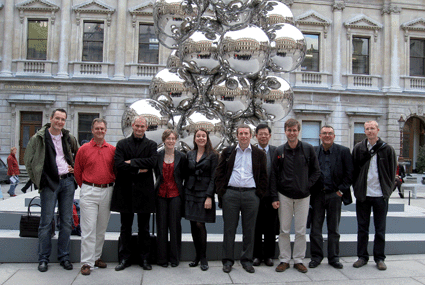Polymer Chemistry
Welcome to the very first issue of Polymer Chemistry from the Royal Society of Chemistry! RSC Publishing is one of the most important publishers of chemistry in the world with a strong heritage and reputation for publishing science of the very best quality in the service of global chemistry, and has a great track record for new journal launches such as Soft Matter, Lab on a Chip, and Nanoscale. The RSC has the objective of advancing the chemical sciences through all of its activities. As polymers are an integral part of everyone's life in all aspects it is appropriate that we have an RSC journal devoted to polymer chemistry, where the most innovative and informative polymer chemistry can be published from across the international community. In addition we can expect the very highest quality standards to be applied as well as making sure we have the most efficient processes in place to ensure timely and rapid publication. The journal will be free for anyone to access for the first two years, following a simple registration procedure.Polymer chemistry has grown in stature within the chemical community as we have seen new synthetic methodology, characterisation techniques and applications emerge to place us as central to the discipline. Now there are very few areas that are not touched by polymer chemistry from the traditional replacement of natural materials to polymers with many different functional properties. How many polymers are in your mobile phone and what are they used for? There will be polymers for the casing, the display, the circuit boards, the electrolyte in the battery, adhesives, the lithography processes, memory storage and many others. Polymers will without any doubt play an important, indeed necessary, role in helping us solve the problems of the world in which we live, from new therapeutics for the developing world and in helping an aging population in the developed world, harnessing natural sources for energy (from solar cells to fuel cells), helping us provide the food we need, self healing materials to the more traditional uses in coatings, compatibilisers, viscosity modifiers and plastics.
It is our intention to cover all of these areas by attracting the highest quality primary research papers, communications and reviews. In addition we will embrace new developments in scientific publishing, as long the quality thresholds are maintained, to give our community a journal it deserves and which it will be proud of. We have already been able to attract top authors to the journal and we will be looking to increase this over the next few years. We are particularly keen to publish the best work from the best younger scientists in our field as we hope the next generations of polymer chemists see Polymer Chemistry as their own journal representing what they need from their top journal.
Well here it is, issue 1, and I feel extremely privileged to have been asked to launch this new venture. I am very pleased to have been joined by Eva Harth and Yuliang Yang as Associate Editors and a really excellent Editorial Board in Paul Burn, Jan van Hest, Neil Cameron, Stefan Hecht, Christopher Barner-Kowollik and Eiji Yashima, as well as an impressive Advisory Board to help us in this endeavour.
 | ||
| Fig. 1 Left to right: Stefan Hecht, Paul Burn, Jan van Hest, Carol Stanier, Eva Harth, Neil Cameron, Yuliang Yang, Chris Barner-Kowollik, Dave Haddleton, Adam Limer. | ||
In addition, we have been very fortunate in that we will be working with the excellent RSC team behind Soft Matter and Journal of Materials Chemistry, led by Carol Stanier, which we join to give a complete spectrum of top journals for polymer and materials chemistry.
Submissions will be handled by Eva, Yuliang, and myself. We are all committed, alongside the RSC production team, to an efficient, rapid, and above all fair treatment of your manuscripts from submission to publication. I hope you will join us and submit your best work to us soon. We hope to meet you around the world in the coming months where we will be able to answer your questions and demonstrate the strength of this new journal Polymer Chemistry.
Professor David Haddleton
Editor-in-Chief, Polymer Chemistry
| This journal is © The Royal Society of Chemistry 2010 |

